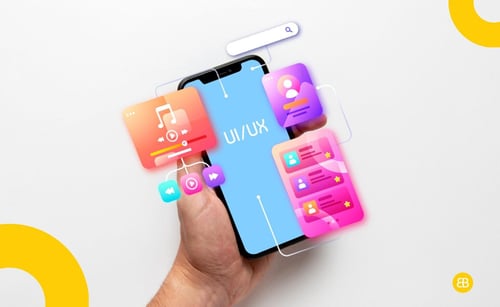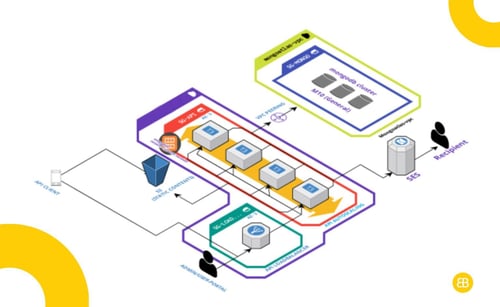Table of Contents
There are multiple aspects to take into consideration when building an app.
For your app development team to succeed, they need to have everything figured out, from the initial discovery phase down to the last details of the final product.
And it’s not just the development team that needs to be involved – for your new app to make its way onto your clients’ mobile devices, you also need a good marketing strategy. The more in-depth you analyse the mobile development process, the more complex it may appear.
This article will not only shed light on the necessary parts of the process but also uncover important strategies that make the difference between success and failure. If you want your mobile app built knowing that all these strategies are taken into consideration (and many more), let EB Pearls take care of the development!
What is a Mobile App Development Strategy?
A mobile app development strategy is a systematic plan outlining the essential steps and considerations involved in creating a successful mobile application.

Beginning with the initial discovery stage, a comprehensive analysis of critical phases is required to create a strategy plan for a mobile app. At this stage, you must determine the app’s function, who will use it, and how they will interact with it. This involves a holistic strategy that includes:
- Identifying the target market;
- Researching the competition and their products;
- Determining the extent of the project;
- Identifying the features that are crucial for success;
- Taking account of the development needs, timeline, and budget for the project.
Choosing the Right Application Architecture

The next step after a comprehensive discovery phase is choosing the app’s architecture.
At this stage, you’ll decide on the application architecture, development frameworks, and languages for the mobile app.
In the process of creating a mobile app, there are four primary methods:
- Native
Apps developed using the platform’s official language and frameworks are known as “native.” This includes iOS’s Swift and Objective-C as well as Android’s Java. If you’re just planning to build one platform at a time, this method will give you the best results.
- Cross-Platform
A wide variety of languages and frameworks are capable of creating cross-platform applications. Simplicity and the ability to use a single codebase across multiple platforms make this strategy ideal for mobile apps. More complicated mobile applications that require platform-specific capabilities won’t work well using this method.
- Hybrid
JavaScript, CSS, and HTML5 are some standard web technologies used to build hybrid mobile apps. With this method, programmers can build apps once and have them operate on both iOS and Android. But hybrid apps aren’t always as fast as native apps, so speed can be an issue.
- Progressive
PWAs, or progressive web apps, are web applications that mimic the functionality of native apps by taking advantage of features included in modern web browsers. The use of this method paves the way for the creation of fast-loading, offline applications.
Because they don’t need as much upkeep or investment as native apps, PWAs are very economical.
The Importance of App Testing
A successful development process relies heavily on thorough testing. To get the most out of testing resources, it’s best to focus on the most important aspects of an app and ignore the less important ones. The testing methodologies are chosen with great care, with a focus on:
- Unit testing to ensure the operation of individual components;
- Integration testing to ensure that components interact seamlessly;
- User acceptance testing to ensure that the final product meets user expectations.
To ensure a complete review of different scenarios and to discover and fix bugs before app release, mobile app developers must create detailed test cases.
8 Must-Have Strategies in Your App Development Process

- Customer Support
Your app is a product that people buy and use all the time. To make sure your clients can get assistance whenever they need it, it is usually vital to offer 24/7 support.
Prepare to accommodate a wide variety of channels, such as email, SMS, live chat, social media, and your app’s built-in chatbot.
- Data Security
Information like credit card details, social security numbers, addresses, and usernames and passwords are gathered by mobile apps. To prevent unauthorised access to or disclosure of user data, all information should be securely encrypted.
Make sure your users are aware of your data usage plans by having a privacy policy. Also, make sure your app has privacy options, so users can choose what information to disclose.
- Monetisation
Making money out of your app is the next logical step after making it. A strategy for monetising your app should be part of your app development plan.
Paying users, freemium models, in-app purchases, subscriptions, ads, and in-app purchases are just a few ways to monetise your apps.
- Performance
If you want your app to remain competitive in the dynamic mobile app market, you need to optimise it for better performance and use the latest technologies.
Before releasing your app to the public, test it on all major platforms to find and fix any issues with performance or bugs. You should also prepare for future upgrades and maintenance as part of a strategy to keep your app running well.
- Design
You need a distinctive look for your app if you want it to get noticed. Make your UI beautiful and simple to use, so people can use all your features without any problems.
Make sure the design is the same on every platform. If you want your brand’s visual identity to be consistent and convey its personality, it’s best to work with a professional design team.
- Scalability
You need to make sure your mobile app can handle updates and changes in the future. Modular code, a scalable design, and the ability to add new features and functionality are just a few of the numerous approaches to making your app scalable.
- Cloud Technology
When compared to more conventional methods, cloud-based mobile app development solutions offer significant performance and scalability benefits to organisations.
By building mobile apps in the cloud, companies can take advantage of dispersed processing resources and effortlessly scale their apps up or down.
Furthermore, due to their frequent system updates and use of several layers of security procedures, cloud-based technologies provide greater security than on-premise alternatives.
- Marketing
The key to success is getting the word out about your app. Strong branding is an important part of developing an app and is the foundation of every successful marketing campaign.
Use press releases and app-centric narratives to prioritise public relations to increase awareness before launch. In addition, you may increase excitement and buzz for your mobile app before its launch by running pre-launch promotions through social media and email.
Frequently Asked Questions
Which Methodology is Most Effective for Creating Apps?
The Agile methodology is among the most popular choices. A hallmark of the Agile methodology is its iterative and adaptable design. It is well-suited for projects with changing requirements because it permits frequent evaluation and adaptation. It promotes collaboration, user feedback, and quick responses to changes.
What is the Expected Mobile App Development Cost?
In 2022, according to GoodFirms, the price range for an app was as follows: US $40k to US $60k for a simple app, US $61,000 to US $69,000 for a medium-complexity app, and US $70,000 to US $100,000 for a feature-rich app.
Final Thoughts

This article has covered key aspects crucial for successful mobile app development. From the initial planning to choosing the right technology, testing thoroughly, and incorporating essential strategies, each step contributes to building a standout and reliable app.
As you embark on your app development journey, consider the expertise of EB Pearls for a smooth and successful experience.

Nikesh leads our technical revolution, ensuring efficiency and keeping us ahead with the latest technologies to meet client expectations.
Read more Articles by this Author
